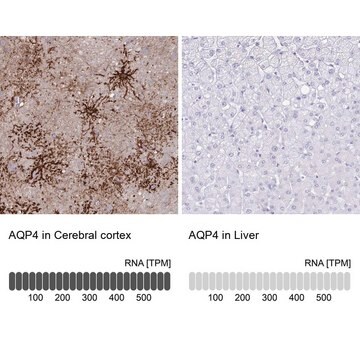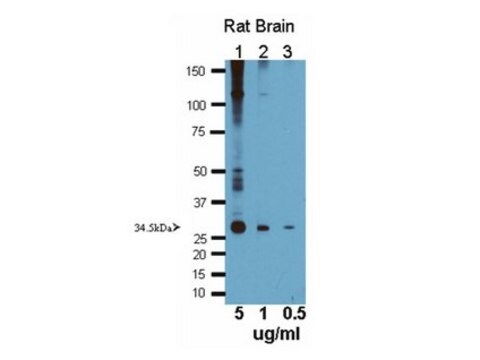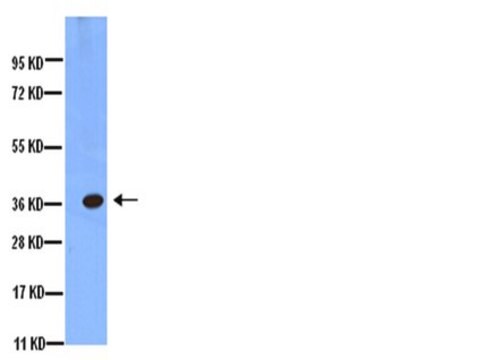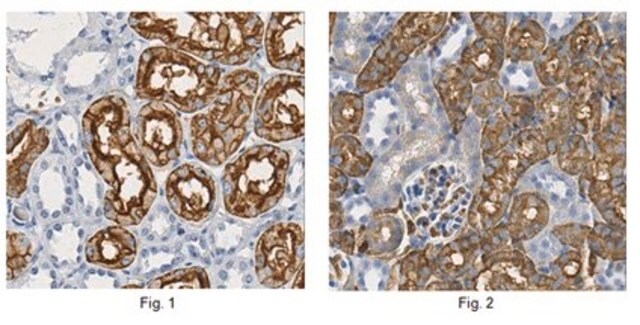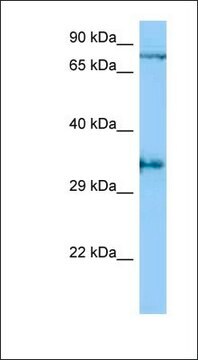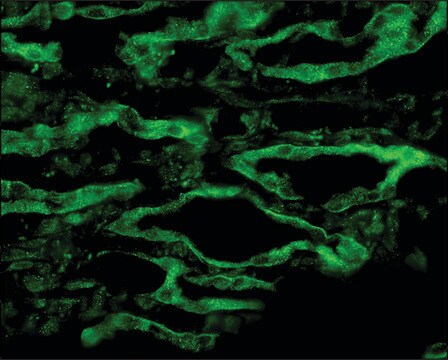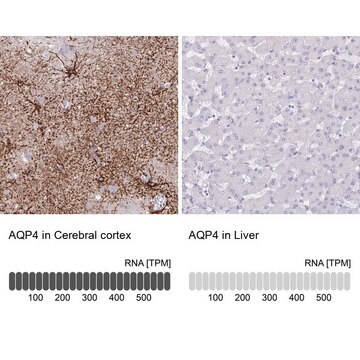ABN411
Anti-Aquaporin-4 Antibody
from rabbit, purified by affinity chromatography
Synonym(s):
Aquaporin-4, AQP-4, Mercurial-insensitive water channel, MIWC, WCH4
Sign Into View Organizational & Contract Pricing
Select a Size
All Photos(1)
Select a Size
Change View
About This Item
UNSPSC Code:
12352203
eCl@ss:
32160702
NACRES:
NA.41
Recommended Products
General description
Aquaporin-4 (AQP-4) is also known as Mercurial-insensitive water channel. AQP-4 is an osmoreceptor which regulates body water balance and mediates water flow within the central nervous system. It is expressed predominantly in the mature brain, but also in the eye, kidney, intestine and lung. AQP-4 is a multi-pass membrane protein that is part of a complex along with MLC1, TRPV4, HEPACAM and ATP1B1.
Specificity
This antibody recognizes the cytoplasmic domain of Aquaporin-4.
Immunogen
Epitope: Cytoplasmic domain
KLH-conjugated linear peptide corresponding to the cytoplasmic domain of rat Aquaporin-4.
Application
Anti-Aquaporin-4 is an antibody targeting the Aquaporin-4 protein, validated for use in WB.
Research Category
Neuroscience
Neuroscience
Research Sub Category
Developmental Neuroscience
Developmental Neuroscience
Quality
Evaluated by Western Blotting in human brain tissue lysate.
Western Blotting Analysis: 1.0 µg/mL of this antibody detected Aquaporin-4 in 10 µg of human brain tissue lysate.
Western Blotting Analysis: 1.0 µg/mL of this antibody detected Aquaporin-4 in 10 µg of human brain tissue lysate.
Target description
~32 kDa observed
Physical form
Affinity purified
Purified rabbit polyclonal in buffer containing 0.1 M Tris-Glycine (pH 7.4), 150 mM NaCl with 0.05% sodium azide.
Storage and Stability
Stable for 1 year at 2-8°C from date of receipt.
Analysis Note
Control
Human brain tissue lysate
Human brain tissue lysate
Other Notes
Concentration: Please refer to the Certificate of Analysis for the lot-specific concentration.
Disclaimer
Unless otherwise stated in our catalog or other company documentation accompanying the product(s), our products are intended for research use only and are not to be used for any other purpose, which includes but is not limited to, unauthorized commercial uses, in vitro diagnostic uses, ex vivo or in vivo therapeutic uses or any type of consumption or application to humans or animals.
Not finding the right product?
Try our Product Selector Tool.
Storage Class Code
12 - Non Combustible Liquids
WGK
WGK 1
Flash Point(F)
Not applicable
Flash Point(C)
Not applicable
Certificates of Analysis (COA)
Search for Certificates of Analysis (COA) by entering the products Lot/Batch Number. Lot and Batch Numbers can be found on a product’s label following the words ‘Lot’ or ‘Batch’.
Already Own This Product?
Find documentation for the products that you have recently purchased in the Document Library.
Jacqueline A Hubbard et al.
ASN neuro, 9(1), 1759091416687846-1759091416687846 (2017-01-13)
Maintenance of glutamate and water homeostasis in the brain is crucial to healthy brain activity. Astrocytic glutamate transporter-1 (GLT1) and aquaporin-4 (AQP4) are the main regulators of extracellular glutamate and osmolarity, respectively. Several studies have reported colocalization of GLT1 and
Jacqueline A Hubbard et al.
Experimental neurology, 283(Pt A), 85-96 (2016-05-08)
Astrocytes regulate extracellular glutamate and water homeostasis through the astrocyte-specific membrane proteins glutamate transporter-1 (GLT1) and aquaporin-4 (AQP4), respectively. The role of astrocytes and the regulation of GLT1 and AQP4 in epilepsy are not fully understood. In this study, we
Nicholas S Caron et al.
The Journal of neuroscience : the official journal of the Society for Neuroscience, 41(4), 780-796 (2020-12-15)
Huntington disease (HD) is a neurodegenerative disease caused by a CAG trinucleotide repeat expansion in the huntingtin (HTT) gene. Therapeutics that lower HTT have shown preclinical promise and are being evaluated in clinical trials. However, clinical assessment of brain HTT
Our team of scientists has experience in all areas of research including Life Science, Material Science, Chemical Synthesis, Chromatography, Analytical and many others.
Contact Technical Service
